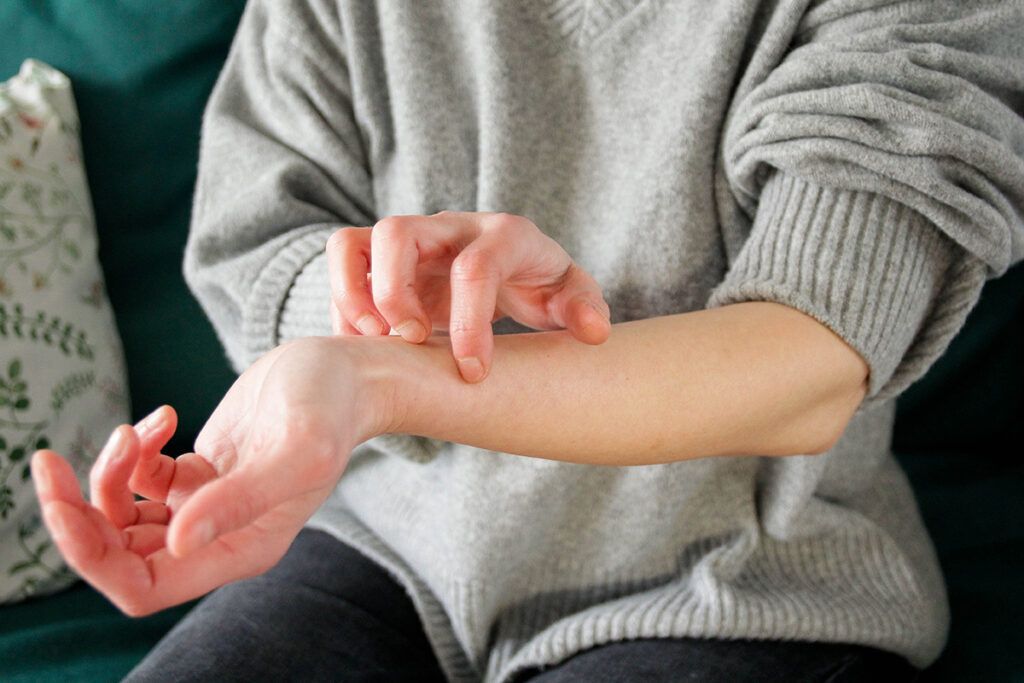Liver disease is a condition affecting your liver’s ability to function. Common types of liver disease include:
- hepatitis
- cirrhosis
- fatty liver disease
These conditions can result from various factors, like alcohol use disorder, metabolic syndrome, viral infections, and genetics.
This article explores itchiness as a symptom of liver disease.
Is itchiness a usual symptom of liver disease?

Itchiness, also known as pruritus, is a common symptom of liver disease. It rarely happens with a rash or other skin changes. However, scratching your skin regularly or severely can cause wounds or a rash-like appearance.
The presence or severity of pruritus does not necessarily indicate the stage or type of liver disease. Not everyone with liver disease experiences itchiness.
Pruritus related to liver disease may change throughout the condition. For some people, it may intensify throughout the day, often feeling worse at night.
Liver disease itching may affect the entire body (generalized) or only specific areas of the body (localized), like your hands or feet.
Itching alone is not a symptom of liver disease; only a healthcare professional can determine the root cause of pruritus.
Can itchiness be a symptom of liver detox?
No, itchiness is not a symptom of liver detox.
Liver detoxification is a natural process that occurs in the liver every day. It does not usually cause any symptoms.
Causes of itchiness in liver disease
The exact cause of itchiness in liver disease is not fully understood, but we will discuss some previous studies to understand this symptom.
According to a 2019 review, people with conditions affecting the production or flow of bile are more likely to experience itching.
The same review noted that individuals with hepatitis C sometimes report itching, while hepatitis B rarely causes this symptom. Further, those with alcohol-related fatty liver disease or who have fatty liver because of other health issues are less likely to experience pruritus.
A 2015 review suggests that the following compounds may cause itching if you have liver disease:
- Bile salts: The liver produces bile, a digestive juice stored in the gallbladder. Bile salts can accumulate in your body if bile flow is obstructed (as in jaundice), and experts believe this is the main cause of pruritus. Research shows that injecting healthy individuals with bile salts can cause itching, while draining bile salts from people having itchiness can reduce their symptoms. Yet, in some people, there appears to be no correlation between bile salt levels and itchiness.
- Histamines: Your body releases compounds called histamines as part of inflammatory and allergic reactions, which can cause itchiness. Some people with liver disease itchiness have elevated histamine levels.
- Pregnancy hormones: Some people with liver disease experience itching when they are pregnant. They may experience itching due to changes in their hormones or while undergoing hormone replacement therapy.
- Lysophosphatidic acid: Though it is unclear how it affects itching, high levels of this type of fatty acid (phospholipid) may cause the itching to get worse.
According to the studies mentioned above, other factors that may contribute to liver disease itching or make it worse include:
- dry skin
- stress
- heat
- contact with certain fabrics, like wool
Other symptoms of liver disease
According to research from 2015 and 2022, liver disease may cause specific symptoms, including:
- fatigue
- depression and anxiety
- sleep disturbances
- pain
- cognitive impairment
- dizziness and fainting
- changes in heart rate and pressure
- sweating
- blurry vision
- unusually colored urine or stools
- jaundice or yellowing of the skin or eyes
- anemia
- ascites or buildup of fluid in the stomach
Not everyone with liver disease will experience these symptoms, and some people may not experience any at all, particularly during the early stages.
If you think you are at a higher risk of developing liver disease, consider consulting with a healthcare professional for an accurate evaluation.
How to manage liver-induced itchiness
Itchiness associated with liver disease can be challenging to manage.
While treating the underlying liver condition is the most effective approach, you can try these tips to reduce the itch:
- Moisturize your skin: Applying a moisturizer regularly can soothe dry and itchy skin.
- Avoid hot showers or baths: Hot water can dry out the skin and worsen your itching. Opt for lukewarm or cool water instead.
- Wear loose-fitting, breathable clothes: Tight clothing can irritate your skin. Opt for loose-fitting clothing made from soft, breathable fabrics like cotton.
- Avoid scratching: As tempting as it may be, scratching can damage your skin and make itching worse. Try using a cold compress or gently patting the itchy area instead.
- Ask a health professional about antihistamines: These medications can relieve itching, but they may cause drowsiness or other side effects, so it’s best to talk with a doctor before taking them.
- Use medicated creams: A doctor may prescribe a medicated cream to relieve itching. These contain corticosteroids or other medications that reduce inflammation and soothe your skin.
- Take a cool bath with oatmeal: Add colloidal oatmeal to lukewarm bathwater and soak for 15–20 minutes for relief.
- Avoid triggers: Avoid triggers like perfumes, scratchy fabrics, hot and humid environments, and direct sunlight.
A healthcare team may help you determine the best treatment for itching based on your underlying condition and medical history.
If you need help covering the cost of medications, the free Optum Perks Discount Card could help you save up to 80% on prescription drugs. Follow the links on drug names for savings on that medication, or search for a specific drug here.
